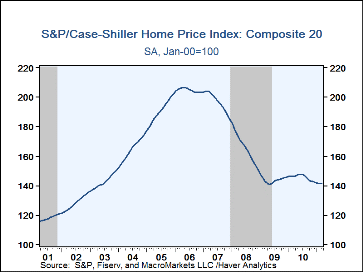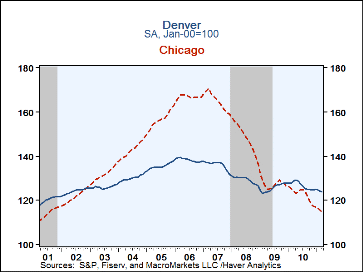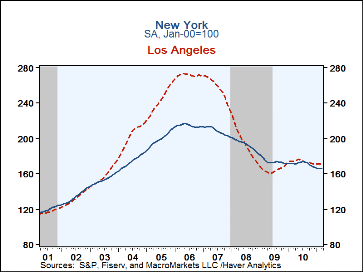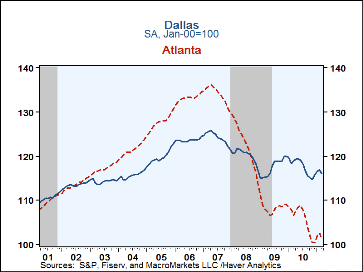 Global| May 31 2011
Global| May 31 2011U.S. Case-Shiller Home Price Index Double-Dips
by:Tom Moeller
|in:Economy in Brief
Summary
Home prices have been seesawing, giving back all of the support created by last year's home-buyer tax credit. The seasonally adjusted Case-Shiller 20-City Home Price Index fell 0.2% m/m in March after an unrevised 0.2% February drop. [...]
Home prices have been seesawing, giving back all of the support created by last year's home-buyer tax credit. The seasonally adjusted Case-Shiller 20-City Home Price Index fell 0.2% m/m in March after an unrevised 0.2% February drop. It was the ninth consecutive monthly decline in the seasonally adjusted series. Moreover, the latest index level was nearly the lowest since March, 2003. Not seasonally adjusted prices fell 0.8% during March. The latest decline roughly matched consensus expectations. During the last twelve months, prices fell 3.5%. The narrower 10 City Composite Home Price Index of prices fell 0.6% (-2.9% y/y) during March, also down for the ninth consecutive month.
Price declines continued throughout the U.S. During the last twelve months, declines were most notable in Minneapolis, (-9.8%), Phoenix (-8.5%), Portland (-7.6%), Chicago (-7.5%), and Seattle (-7.4%). Moderate price declines were logged in San Francisco (-4.9%), New York (-3.3%), Dallas (-2.4%), Los Angeles (-1.7% y/y) and Detroit (-0.8%). Prices rose in Washington D.C. (4.4%).
The Case-Shiller home price series is value-weighted, i.e., a greater index weight is assigned to more expensive homes. The S&P/Case-Shiller home price series can be found in Haver's USECON database and the city data highlighted below is in the REGIONAL database.
The S&P/Case-Shiller home price series can be found in Haver's USECON database. The city data is in the REGIONAL database.
| S&P Case-Shiller Home Price Index (SA,%) | Mar | Feb | Jan | Mar Y/Y | 2010 | 2009 | 2008 |
|---|---|---|---|---|---|---|---|
| 20 City Composite Index | -0.2 | -0.2 | -0.2 | -3.5 | 1.3 | -13.3 | -15.7 |
| Regional Indicators | |||||||
| Atlanta | -1.2 | 0.6 | 1.4 | -5.1 | -2.4 | -11.6 | -8.5 |
| Boston | -0.9 | -0.7 | 0.6 | -2.6 | 1.9 | -4.9 | -5.7 |
| Chicago | -0.8 | -0.7 | -0.2 | -7.5 | -3.7 | -14.2 | -10.0 |
| Charlotte | -2.6 | -0.8 | -0.7 | -6.8 | -3.4 | -8.2 | -1.9 |
| Cleveland | -1.3 | 0.6 | 0.5 | -6.2 | 0.7 | -4.8 | -7.3 |
| Dallas | -0.8 | 0.3 | 0.6 | -2.4 | 0.1 | -2.3 | -3.2 |
| Denver | -0.3 | -0.5 | 0.2 | -3.7 | 0.9 | -2.8 | -4.9 |
| Detroit | -0.7 | 1.8 | 0.8 | -0.8 | -3.4 | -21.3 | -17.9 |
| Los Angeles | 0.1 | -0.1 | 0.2 | -1.7 | 5.3 | -15.4 | -24.2 |
| Miami | 0.3 | -1.5 | -0.8 | -6.0 | -2.1 | -22.0 | -26.5 |
| Minneapolis | -2.5 | -1.5 | -1.6 | -9.8 | 3.1 | -15.7 | -14.3 |
| New York | -0.1 | -0.2 | -0.9 | -3.3 | -1.6 | -9.8 | -7.4 |
| Phoenix | 0.1 | 0.1 | -0.1 | -8.4 | -0.3 | -28.0 | -27.5 |
| San Francisco | 0.5 | -1.6 | -0.3 | -4.9 | 9.3 | -18.4 | -24.3 |
| Seattle | 0.2 | -1.7 | -1.1 | -7.4 | -3.6 | -14.3 | -7.3 |
| Tampa | 0.0 | -0.1 | -0.3 | -6.9 | -4.0 | -18.8 | -19.2 |
| Washington, D.C. | 1.2 | 0.5 | 0.2 | 4.4 | 4.8 | -10.8 | -15.7 |
Tom Moeller
AuthorMore in Author Profile »Prior to joining Haver Analytics in 2000, Mr. Moeller worked as the Economist at Chancellor Capital Management from 1985 to 1999. There, he developed comprehensive economic forecasts and interpreted economic data for equity and fixed income portfolio managers. Also at Chancellor, Mr. Moeller worked as an equity analyst and was responsible for researching and rating companies in the economically sensitive automobile and housing industries for investment in Chancellor’s equity portfolio. Prior to joining Chancellor, Mr. Moeller was an Economist at Citibank from 1979 to 1984. He also analyzed pricing behavior in the metals industry for the Council on Wage and Price Stability in Washington, D.C. In 1999, Mr. Moeller received the award for most accurate forecast from the Forecasters' Club of New York. From 1990 to 1992 he was President of the New York Association for Business Economists. Mr. Moeller earned an M.B.A. in Finance from Fordham University, where he graduated in 1987. He holds a Bachelor of Arts in Economics from George Washington University.
More Economy in Brief
 Global| Feb 05 2026
Global| Feb 05 2026Charts of the Week: Balanced Policy, Resilient Data and AI Narratives
by:Andrew Cates










